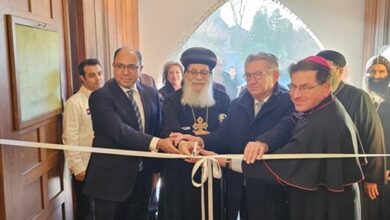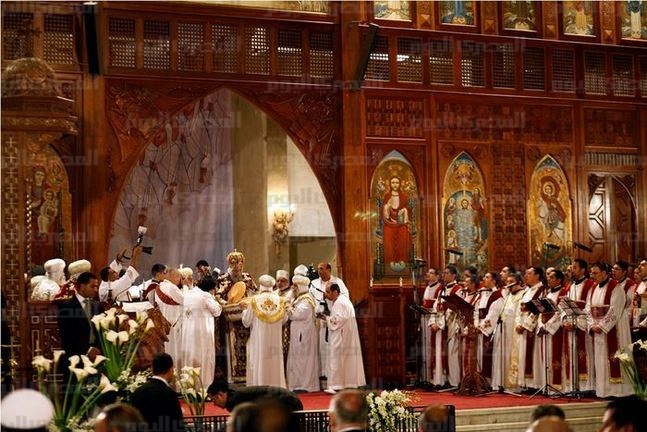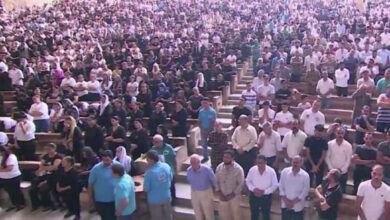
When Rafek Farouk, cofounder of Copts 38, begun to chant against the Coptic Church’s divorce laws inside the church’s headquarters, dogs were brought in to run him and others off the grounds.
The Copts 38 activist group was named after a 1938 bylaw which legalized a papal declaration listing ten circumstances under which Copts may divorce. When he ascended to the papacy in 1971, the late Pope Shenouda reduced the permissible grounds to two, although this change was not ratified by the state for nearly four decades.
Since then, Copts can only get the church’s permission for a divorce and a second marriage if their spouse commits adultery or converts to another Christian sect or another religion.
“Throughout history, the Coptic Church has adopted different bylaws to regulate issues of marriage and divorce. Pope Shenouda’s are the most strict,” Farouk says.
Until 2008, Egyptian civil courts made use of the 1938 bylaws without Shenouda’s changes, leaving many Copts divorced in the eyes of the law, but not in those of the church.
Most divorced Copts bore this judgment, and the social isolation which it often brought, quietly. But one, Magdy William, ex-husband of Coptic actress Hala Sedky, changed all that.
Sedky had converted to another sect to get a divorce, which was granted in 2001. Yet Pope Shenouda refused to permit William a second marriage
In 2008, William won a lawsuit against the church ordering Pope Shenouda to pay compensation of LE150,000 as well as obliging the church to issue permission for a second marriage for William.
The case was hugely embarrassing for the church. In the same year, an amendment to the law published in the state’s Official Gazette obliged courts to abide by the church’s bylaws.
The change was slammed by many Copts and rights organizations, since the amendment was never approved either by Parliament or presidential decree. Farouk sees the move as a flagrant indication of the close ties between Mubarak regime and the papacy.
Farouk believes that, since then, 60,000 Copts have been left divorced, and unable to remarry. Naguib Gobrael, a lawyer for the church, told Egypt Independent that almost 12,000 have been divorced in front of civil courts, while 8,000 cases are still under investigation.
A legal maze
A Coptic couple wanting to get church permission for a second marriage has to circumvent the law by signing a customary marriage contract and registering it at the Civil Registry Office, but even this route was blocked when the 2008 bylaw required registry offices to request permission from the church to register the contract.
Gobrael blames the state for not enabling civil marriages for Copts, denying any alleged interventions from the church.
“I call on the state to permit civil marriage for Copts. The church never stood against the right of Copts for civil marriage,” says Gobrael, who quotes Pope Shenouda’s orders not to oppose civil marriage. He describes such a change in the law as the “only way out for Copts 38.”
For a Copt to prove that his/her partner committed adultery, they must show that their partner has spent the night in the house of someone of the opposite sex without necessity or produce papers or letters proving that there was an adulterous relationship. “Who on earth exchanges love letters in 2012?” Farouk wonders.
The church will also nullify the marriage contract in cases of sexually transmitted diseases, deceptions concerning virginity, and infertility. A nullification is technically distinct from a divorce, yet nullifications can still be difficult to obtain, and those whose marriages are nullified are often refused permission to remarry.
Farouk himself successfully applied for his marriage contract to be nullified. “Yet, I am still fighting to get permission for a second marriage. I was told to convert to another sect, but I know that even other sects are controlled by the Orthodox Church and will never accept my conversion,” Farouk claims.
Sedky had to travel to Lebanon to convert to Syriac Christianity. Farouk complained that conversion and registration fees would reach LE50,000.
Adultery, money, or apostasy?
“Proving adultery is difficult; conversion to another sect is expensive. Converting to Islam, with all respect, became the easiest and cheapest way,” Farouk said.
Conversion to Islam opened the space for another dilemma. Thousands of Copts have converted to Islam, filed a divorce case, and converted back to Christianity.
The Ministry of Interior had rejected applications for conversion to Christianity, until the church won a lawsuit in front of the Supreme Administrative Court in 2011.
Gobrael estimates that out of 3,200 cases of Christian conversions to Islam, 20 percent were for divorce reasons.
Moreover, several high-profile conversions to Islam have caused violent sectarian clashes. “More divorce difficulties for Copts means more sectarian tension,” Farouk believes.
For Copts, the importance of the church in their lives has grown as the role of the state in providing a social safety net has steadily diminished. In the church, they can find financial help, education, and medical services, as well as social and cultural activities. Many perceive the church as their shield against a rising tide of sectarianism.
Yet, it has become quite common for Copts to oppose the church’s line in political issues. Many Copts defied the church’s calls to boycott the nationwide protests which deposed Mubarak. The Maspero Coptic Youth Coalition has continued to call for sit-ins and protests, in defiance of the church’s orders.
But religious matters, including matters of marriage and divorce, are a different issue.
“The church is not democratic at all when it comes to religious and marriage issues, and it never claimed to be,” says Youssef Sedhom, chief editor of the Coptic newspaper Watani.
For the Coptic mainstream, there is no real debate over the divorce laws, and Sedhom argues that Copts 38 is unlikely to change that.
“Copts 38 is a minority. I acknowledge that they have demands that need to be addressed, but their significance, compared to the vast majority of Copts, is minimal,” he says.
Farouk believes otherwise.
“When one of these average Coptic citizens is plagued with a problem in his or her marriage, they will have the courage to confront the church’s authority. Ordeals change people,” Farouk says.
Constitutional battle
Article 2 of the 1971 Constitution stipulates that Islam is the state’s official religion, and the principles of Islamic Sharia are the main source of legislation. The church has lobbied for a new clause, allowing non-Muslims to resort to their own religious authorities in their personal affairs.
Copts 38 slammed the proposal, calling it a solidification of a theocratic state within the Coptic community.
The association presented a legal memo to the Constituent Assembly, including their demands to cancel the new changes to Article 2, leaving it as it is. Another memo was presented including the opinions of other popes who acknowledged more reasons for church-sanctioned divorces than those allowed by Pope Shenouda.
Members of the association also presented an alternative if efforts to cancel the changes to Article 2 failed: adding another clause to the article stipulating that non-Muslims, if they choose to resort to their religious authority, may do so only in matters of general consensus for all sects of the same religion. The amendment also stipulates that in cases of lack of consensus, the general laws of the state shall be implemented, referring to Islamic Sharia.
“Divorce conditions are not an issue of general consensus in Christianity as every sect sets its own conditions. In this case, Islamic Sharia will be applied and we will have the right to divorce,” Farouk explains.
Gobrael, on the contrary, argued that marriage is not a civil issue, but lies at the core of the Christian dogma, and should be protected in the constitution.
“A clause to grant Copts the right to resort to their religious jurisdiction in personal status issues is a demand of millions of Copts,” he says.
In the Constituent Assembly, discussion is ongoing. But Farouk doubts that the demands of Copts 38 will be satisfied.
“It is unlikely that the assembly will the meet the demands of thousands, at the expense of those millions of Copts who adopt the church’s official stance,” he concludes.




